A Tale of Campus Homophobia in Two Parts
TW: Discussion of homophobia
By: Eliza Mussmann
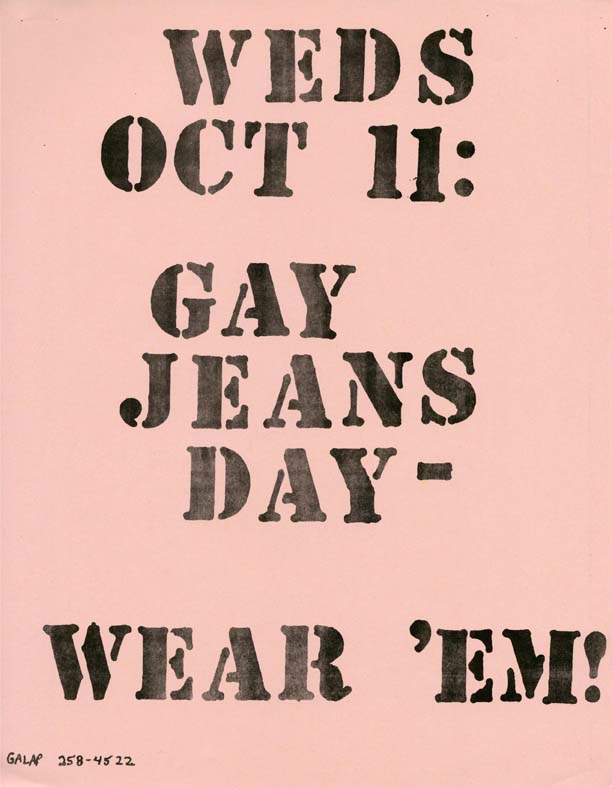
Why Jeans?
Blue jeans were chosen very intentionally as most students wore jeans every single day, meaning that anyone not wanting to support the community had to actively engage with their own homophobia and either choose to change their own routine or wear jeans anyway and risk being treated the way that LGBTQ+ people were treated every day.
The point was to spark debate and start a conversation about homophobia and LGBTQ+ rights on campuses across the US, a goal which it definitely succeeded in.
What is this exactly?
Blue Jeans Days, (or just Gay Jeans Day) referred to are a type of protest that came out of Rutgers University in 1974 and became an incredibly popular event among college LGBTQ+ across the US.
A set day would be chosen and advertised as a day to wear blue jeans on campus in order to show that they support LGBTQ+ Civil Rights. Usually, but not always, this day would align with other important days for LGBTQ+ groups, such as World AIDS Day, Gay Pride Week, or Coming Out Day.
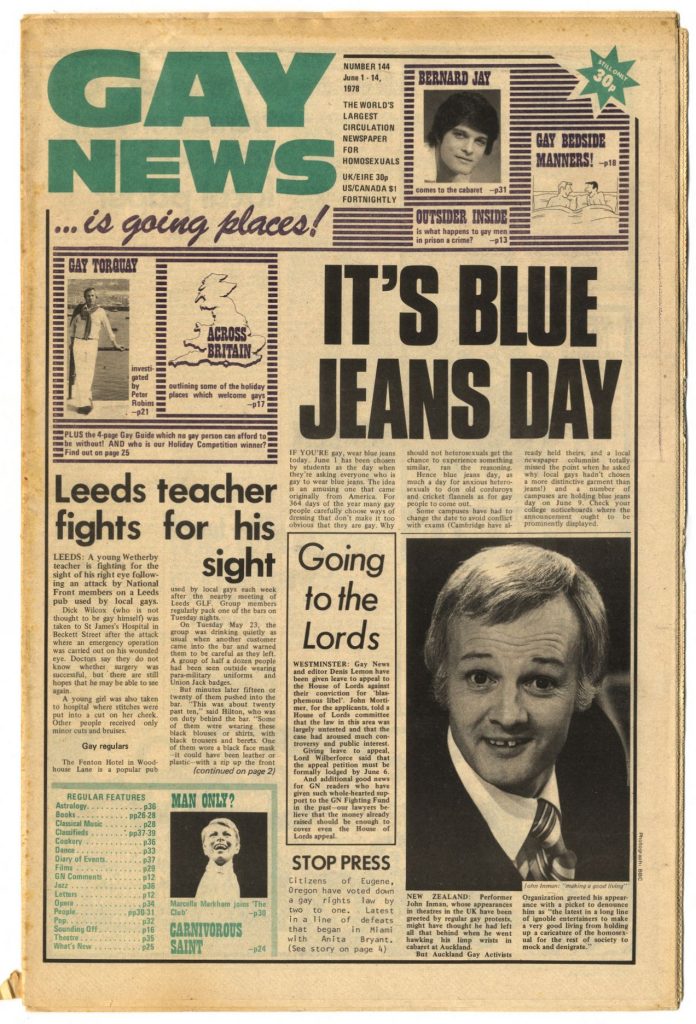
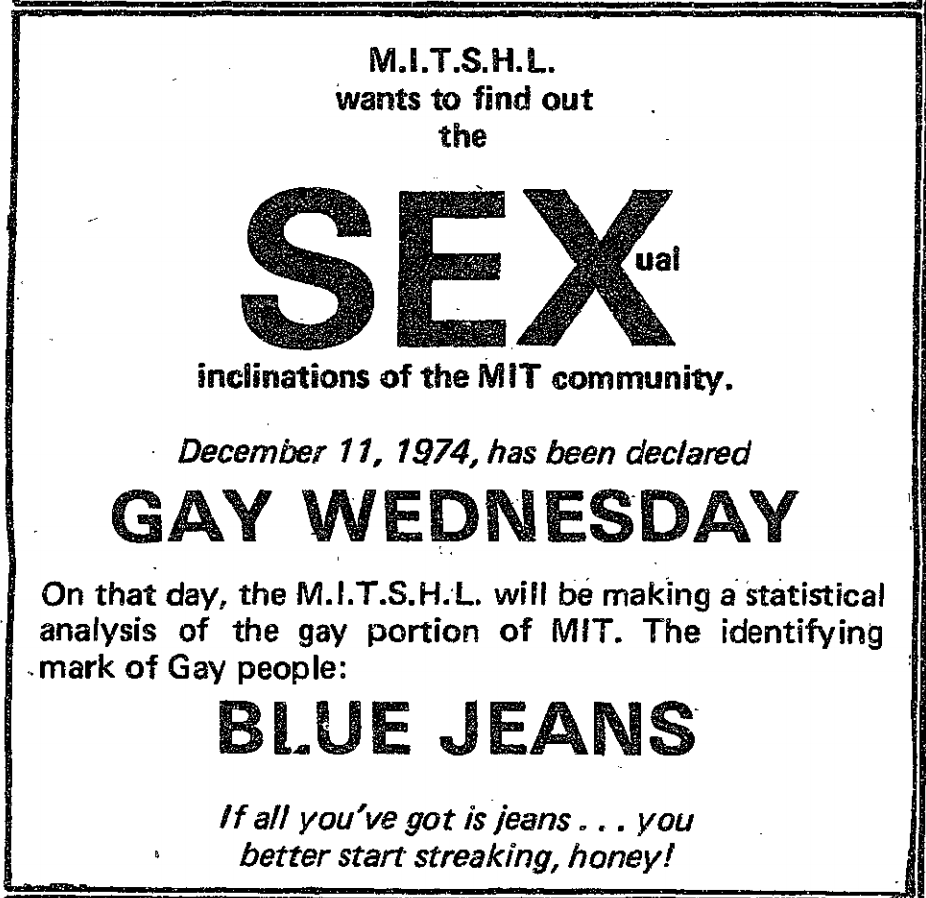
Who participated?
Gay Jeans Days were celebrated almost exclusively on college campuses in the United States, hitting the height of their popularity between 1980 and the early 1990s.
Due to the fact that there was no central organization or even specific day set for Blue Jeans Days, it is difficult to determine exactly how many universities in the US participated in the event. However, a search for the event will pull up dozens of individual institutions with articles or archives relating to the event with most starting between 1976-1989.
??Blue Jeans Day At UNI??
The first UNI Blue Jeans Day was on February 23, 1984, and was organized by the University of Northern Iowa Gay and Lesbian Organization (UNI-GLO). According to a Northern Iowan article from February 21, 1984, UNI-GLO was hoping that the event would serve as an opportunity to draw attention to the fact that LGBTQ+ people were being denied basic rights, such as housing, and were planning to host an information table for anyone looking for more information on LGBTQ+ rights issues, UNI-GLO, or just homosexuality in general.
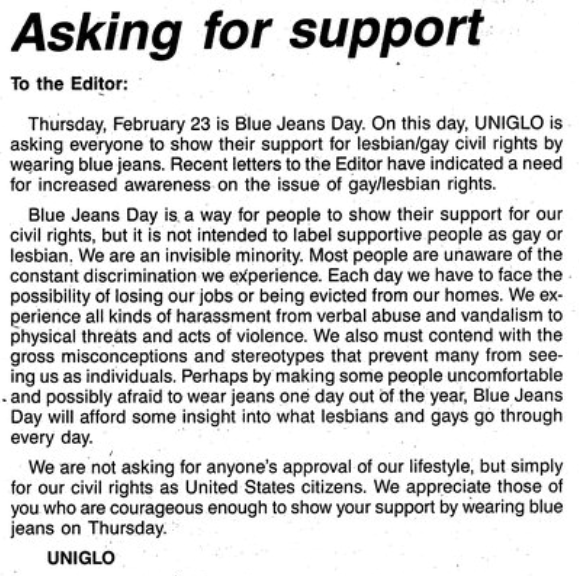
Despite consistent backlash and calls for its cancellation, there was still support for Blue Jeans Days on campus and they ran annually without interruption through at least 1997, which is when currently known records stop referencing the event. This is significant because for two years, 1988-1990 there was no official LGBTQ+ organization on campus. As of now, I have not been able to locate the records regarding who took over the event or if it was officially sanctioned, it is possible that they have not been kept.
TW: Discussion of homophobia and threats of violence
UNI Blue Jeans Day: 1984
Participation?
According to swaths of letters to the editor found in The Northern Iowan and later confirmed in an interview with UNI alum Cindy Bancroft, nearly the entire campus participated…by dressing in their Sunday best. While there were certainly several students who participated and gave their vocal support, they were clearly outnumbered.
“…they were all dressed up, y’know, in their Sunday dresses and there was a lot of chatter. I was like…I was kinda shocked. I mean, I felt like I had walked out of my own little world, I was just kinda shocked like ‘you guys aren’t supporting this? What is wrong with you people?”
Cindy Bancroft, UNI Alum who participated in Blue Jeans Day 1984, on her experience walking out of her dorm room in Campbell Hall wearing blue jeans.
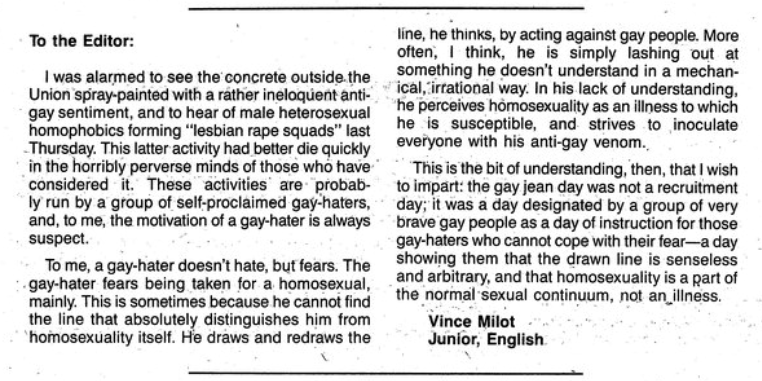
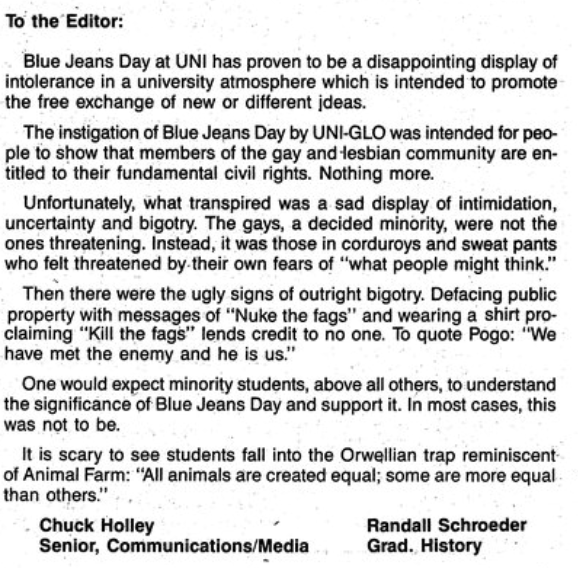
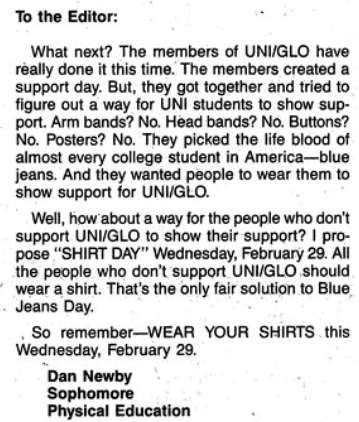
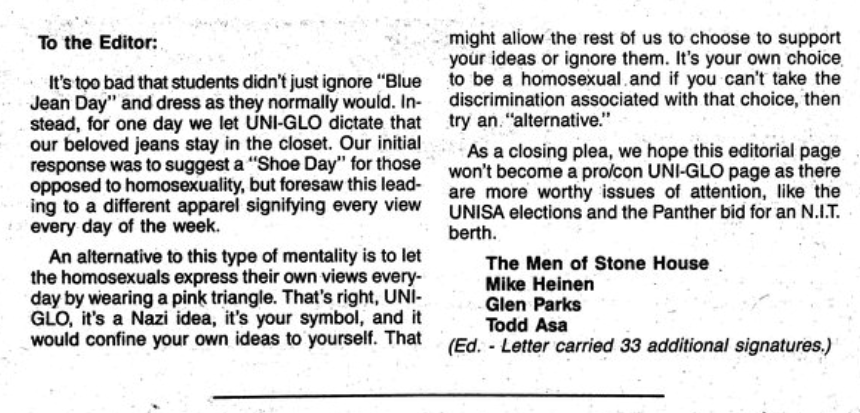
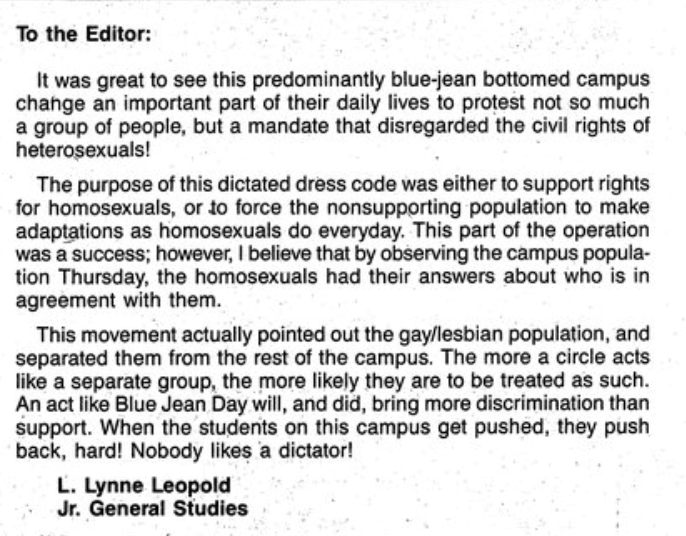
Homophobia
The very first Blue Jeans Day at UNI was met with more than just discourse in a school newspaper, though. Several accounts in The Northern Iowan reference homophobic slurs painted on campus property, students wearing shirts with threats printed on them, and even squads of men harassing, insulting, and even threatening to harm any student wearing jeans. From what I have been able to find from my research the university never publicly addressed this series of events.
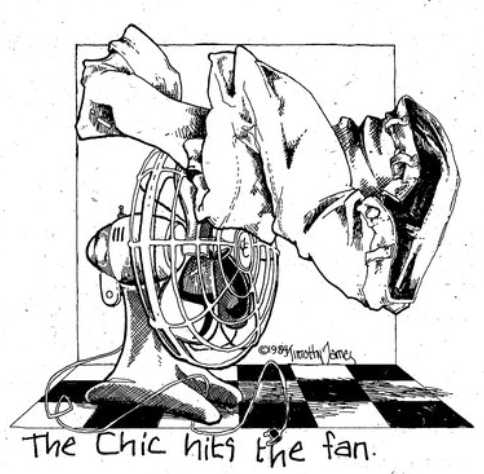
“…and then I remember hearing later on in the day that…y’know…there were groups of guys that were stalking people, behind them, or making comments to them on the way…”
Cindy Bancroft on what it was like on campus on Blue Jeans Day, 1984.
UNI Blue Jeans Day: 1990s
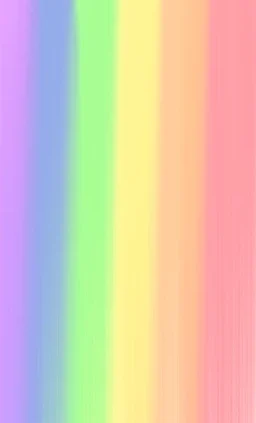
A Change in LGBTQ+ Culture
Homophobia isn’t the only thing that changed its presence on campus, Dr. Lynch discussed a movement towards complete self-expression in LGBTQ+ groups on campus. The growing presence of things like drag shows, both on and off campus, were a part of a movement towards more free self-expression in spite of what might be considered socially acceptable. Perhaps these shows marked a change in attitude towards even previous movements like Blue Jeans Days which itself gave dictation as to how things should be expressed.
“Ya, I think you’re onto something, I think the shift that happened was toward personal expression and those kind of events, that in some ways didn’t even allow personal expression, so people began to use their own, and maybe they felt more licensed to do that too, I don’t know.”
Dr. Annette Lynch on how changes in opinions regarding self-expression may have impacted events like Blue Jeans Days.
The sound of silence?
Despite the massive impact and discourse of the first Blue Jeans Day and continued debate throughout the rest of the 1980s, discussion regarding the event had wained significantly by the early 1990s. A lack of as many relevant newspaper articles or records led me to talk to Dr. Annette Lynch, a Textiles and Apparel professor here at UNI.
Dr. Lynch began working at UNI in 1991 and quickly became involved with Women’s and LGBTQ+ rights organizations and events on and around campus, although she was never directly involved with UNI-GLO/UNIProud.
I was shocked to learn that Dr. Lynch didn’t remember hearing anything about the event, either from her students or through the University.
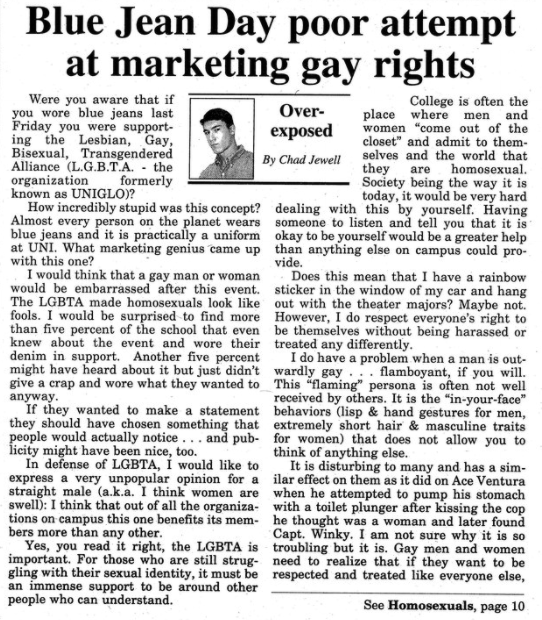
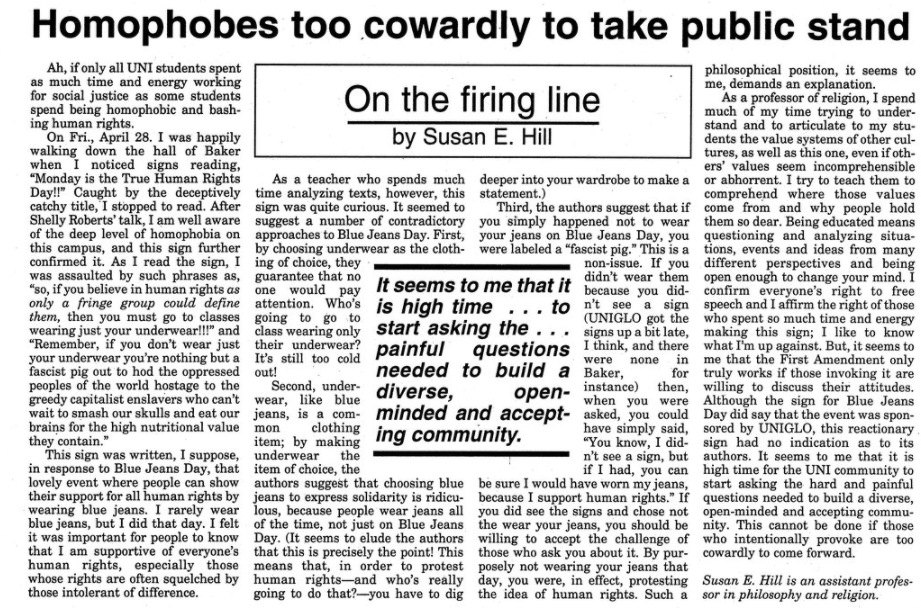
Different Brand of the Same Issue
So, as time went on did students at the University of Northern Iowa learn to overcome and eliminate homophobia? According to Dr. Lynch, no.
“But there was- it was kind of like, the main group of students were not protesting, but they also were not supporting if that makes sense. So I can’t say that it was- that we’d made huge progress, on the other hand I did not see what you’re talking about happening on campus.”
Dr. Annette Lynch on LGBTQ+ acceptance at UNI.
The UNI that Dr. Lynch describes throughout her interview is one that hides its homophobia through silence and apathy rather than in open, public displays.
This is backed up by articles regarding other instances of homophobia on campus, which tended towards indirect actions over any real confrontation, something addressed directly in The Northern Iowan in 1996 in the article “Homophobes too cowardly to make public stand” where an assistant professor describes finding fake fliers that had been printed out and placed around Baker Hall.
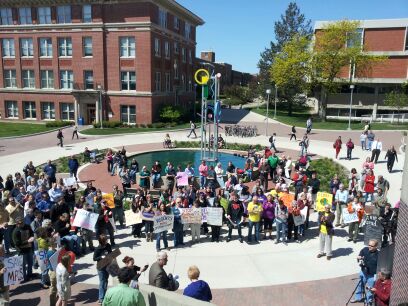
Conclusion
The University of Northern Iowa has, over the years, become an institution known for its unwillingness to take a stand when it comes to issues of civil rights and equality, and based on my research I have found that Blue Jeans Days fell into that same pattern. As of now, I have found no records of the University speaking in favor of these events or condemning the actions of students acting out of violence against LGBTQ+ students during Blue Jeans Days. Despite this, the LGBTQ+ community has continued to grow and thrive and while there is still homophobia on campus, support for LGBTQ+ students and staff has also grown over the years, making UNI a much safer space than it was in 1984.
Bibliography
Armstrong, April C. “‘Wear ‘Em’: Princeton University’s First Gay Jeans Day.” Mudd Manuscript Library Blog. Princeton University, June 9, 2021. https://blogs.princeton.edu/mudd/2021/06/wear-em-princeton-universitys-first-gay-jeans-day/.
Barrymore, Joe, Jessica Craig, Julie Armentrout, Pete Beurskens, and Joseph A. Fosselman. “Blue Jeans Day.” The Northern Iowan. February 26, 1985.
Bryant, Tatiana. “Gay Blue Jeans Day.” Creating Change. University of Oregon, March 21, 2016. https://blogs.uoregon.edu/creatingchange/2016/03/21/gay-blue-jeans-day/.
Cashman, Theresa. “Blue Jean Day Support Requested.” The Northern Iowan. February 21, 1984.
Chung, David R., and Mona Potter. “Blue Jeans Day Stimulates Introspection.” The Northern Iowan. February 19, 1985.
Costa, Claudio. “People at Odds With Human Rights.” The Northern Iowan. February 28, 1986.
Crowley, Pat. “Some Classic Cases of Homophobia.” Cartoon. The Northern Iowan. Cedar Falls, February 21, 1986.
Crowley, Patrick. “Cartoon a Satire on Homophobia.” The Northern Iowan. March 7, 1986.
Draper, Heather. “But Seriously Folks.” The Northern Iowan. February 26, 1985.
Fleuette, Maria, Christine Bess, Jim Hessburg, Gwynne Skinner, Joe Cacciatore, Philip Scrivano, Judy Bennor, and Mary T. Ewald. “Letters to the Editor.” The Northern Iowan. February 19, 1985.
Fone, Byrne. Homophobia: A History. New York, NY: Picador USA, 2001.
“Gay Message Must Be Understood.” The Northern Iowan. Cedar Falls, April 5, 1988.
Hill, Susan E. “Homophobes Too Cowardly to Take Public Stand.” The Northern Iowan. May 5, 1996.
Hindman, Jean. “Blue Jeans Day Created to Support Lifestyle Choices.” The Northern Iowan. February 21, 1986.
Humphrey, Michael J. “Blue Jeans Day Approaches.” The Northern Iowan. February 11, 1986.
Hute, Mary, Vince Milot, Gary Thomas, Brenda Peters, Gary Bute, Barb Preuss, Laura B. Shelby, Clif Moyer, Chuck Holley, and Randall Schroeder. “BJ Day- Reacting to Reaction.” The Northern Iowan. February 28, 1984.
Iwerks, Dan. “’Blue Jeans Day’ Thursday.” The Northern Iowan. April 5, 1988.
Jewell, Chad. “Blue Jean Day Poor Attempt at Marketing Gay Rights.” The Northern Iowan. October 17, 1997.
Jones, Roy, Patrick Dunbar, Dave Ohl, and Joe Modrick. “More Views on Blue Jeans Day.” The Northern Iowan. March 2, 1984.
Lyon, Howard W. “Blue Jeans Day Has No Merit.” The Northern Iowan. April 8, 1988.
Madden, Patrick. “UNI/GLO Insults Reader’s Intellect.” The Northern Iowan. February 15, 1985.
Martin, Drake, Keith Hardeman, David Roskos-Ewoldsen, and Beverly Roskos-Ewoldsen. “Not Fade Away.” The Northern Iowan. March 6, 1984.
McDaniel, James, Norman L. Story, Steven E. Backoff, Keith T. Hardeman, and R.A. Gielau. “Letters to the Editor.” The Northern Iowan. April 12, 1988.
Mehrl, Anne, Peg Mehrl, UNI-GLO, Rebecca O’Meara, David Hills, and Duane Knight. “Blue Jeans Day.” The Northern Iowan. February 22, 1985.
Newby, Dan, Mike Willems, Eddie Worthington, and Michael Skaff. “Letters to the Editor.” The Northern Iowan. February 24, 1984.
Nodurft, Brian, and Amy Marie Moser. “Jewell’s Opinion of Homosexuals ‘Flamboyantly’ Ignorant.” The Northern Iowan. October 24, 1997.
Olson, James. “Idea of Wearing Blue Jeans for a Cause Is ‘Pathetic’.” The Northern Iowan. April 17, 1992.
Pighetti, Chris. “Jeans Day Farce; Jeans Too Common.” The Northern Iowan. April 27, 1993.
Polk, Cindijo. “Letter to the Editor.” The Northern Iowan. April 17, 1984.
Preuss, Barb. “Second Blue Jean Day Set.” The Northern Iowan. February 15, 1985.
Ratekin, Jack G. “Memo To Everyone Involved in Last Thursday’s Debacle.” The Northern Iowan. February 28, 1984.
Reinertson, JoEllyn. “Expresses Devotion to Humanity.” The Northern Iowan. March 1, 1985.
UNI-GLO. “Blue Jeans Day Explained.” The Northern Iowan. February 24, 1987.
UNI-GLO. “Group Calls for Support.” The Northern Iowan. February 12, 1985.
UNI-GLO. “Letters to the Editor: Asking for Support.” The Northern Iowan. February 21, 1984.
Vaserfirer, Andrew. “(In)Visibility in Lesbian and Gay Student Organizing: The Case of Gay Student Services.” Journal of Homosexuality 59, no. 4 (2012): 610–27. https://doi.org/10.1080/00918369.2012.665706.
Vaughan, Deborah A. “Wear Blue Jeans to Show Support for Human Rights.” The Northern Iowan. April 26, 1994.
Walker, Mike. “Dorm Life- but Not as We Know It.” The Northern Iowan. April 8, 1988.
Weddum, Kristin. “UNI-GLO Educates UNI.” The Northern Iowan. October 11, 1988.
Weltha, Craig. “Wednesday Declared as Blue Jeans Day by UNI-G.L.O.” The Northern Iowan. April 7, 1992.